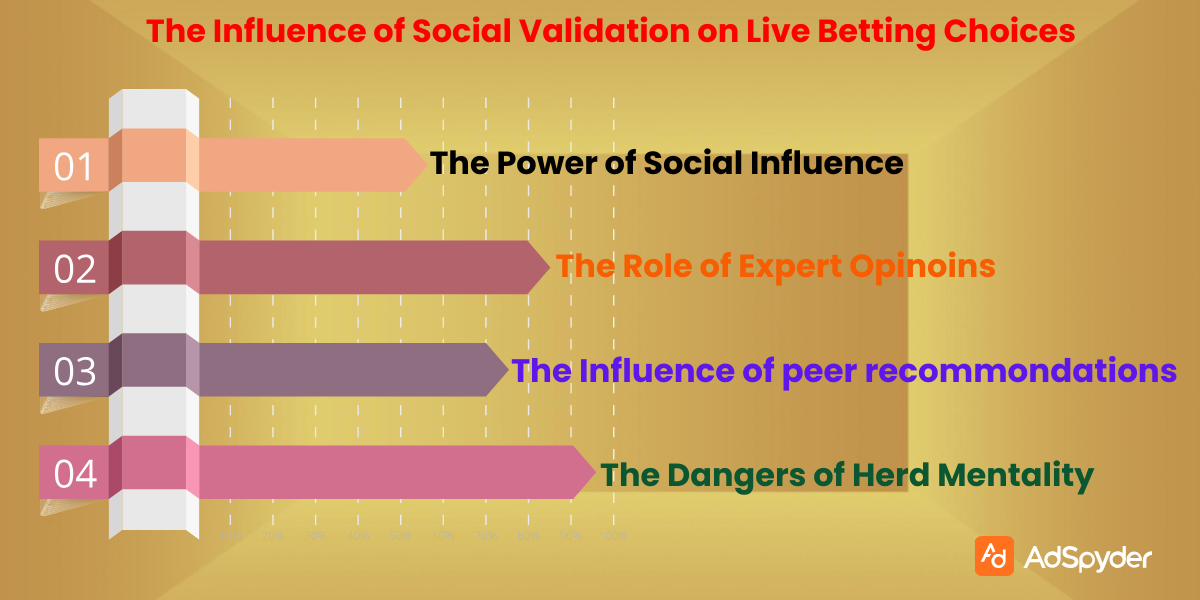In the fiercely competitive landscape of online gambling advertising, marketers are in a constant pursuit of innovative strategies to captivate their target audience and build trust. One such potent tool is social proof, a psychological phenomenon that leverages the influence of others to shape consumer behavior. This blog takes a closer look at the concept of social proof in marketing and how it strongly affects online gambling advertising. We’ll discuss different ways social proof is used in betting ads, understand the psychology behind it, and see how things like customer reviews, endorsements from influencers, activity on social media, and statistical data help create a convincing story.
The Role of Social Proof in Advertising & its Influence in Betting Ads

Social proof is an extraordinary psychological phenomenon that drives individuals to align their choices and decisions with the actions and opinions of others. In the context of gambling advertising, social proof emerges as a pivotal tool for building credibility and trust among potential customers. By showcasing positive interactions and experiences with a brand, marketers can harness the power of social influence to sway user behavior in their favor. This can lead to increase in engagement with the ad campaigns for betting sites.
Using social proof in betting ads involves various elements like customer testimonials, reviews, endorsements from influencers, metrics related to social media engagement, and statistical data. These elements synergize to craft a compelling narrative that fosters confidence. It also motivates users to engage with the advertised betting platforms.
Harnessing the Potential of Social Proof in Advertising for Betting Sites
Real customer testimonials and reviews are some of the most convincing types of social proof in gambling advertisements.
- Integrating authentic customer experiences into ad campaigns humanizes the brand and establishes a deeper connection with potential customers.
- Positive reviews and ratings from satisfied users not only validate the credibility of a betting platform but also offer insights into the quality of services provided.
- These testimonials and reviews serve as endorsements from real individuals, dispelling doubts and hesitations that potential customers might have.
- According to a Trustpilot study, gambling brands that effectively utilize social proof are perceived as more trustworthy by consumers.
By showcasing positive experiences, betting platforms can significantly influence user decisions, leading to increased conversion rates and enhanced brand loyalty.
Influencer Endorsements: A Trusted Voice
In the digital age, influencers hold considerable sway over consumer preferences. This makes their endorsements a potent form of social proof in gambling advertising. Influencers are those individuals or groups who have a considerable follower base. Their content influences these follower base.
- Collaborating with influencers who align with a brand’s values and target audience can provide authentic social proof.
- When influencers share their positive interactions with a gambling brand, their followers are more likely to trust and view the brand favorably.
- However, authenticity and transparency are paramount when leveraging influencer endorsements. Genuine endorsements resonate with audiences, while overly promotional or insincere endorsements can erode trust and credibility.
It is vital to select influencers who genuinely support the brand and its offerings to maintain the integrity of the social proof element. Influencer selection also has to include costs, risks and similarity of follower base with targeted audiences.
Social Media Engagement: A Tangible Indicator of Popularity
In the digital landscape, social media platforms are hubs of user engagement and interactions.
- Betting sites can harness social media metrics like likes, comments, shares, and follower counts as compelling social proof elements.
- A Nielsen study revealed that gambling ads incorporating social proof experienced a 30% higher click-through rate (CTR) compared to those without it.
- Showcasing user engagement and popularity on social media platforms bolsters a betting brand’s credibility. It also nurtures a sense of community among users.
- Betting ads boasting high social media engagement evoke FOMO (Fear Of Missing Out) among users, motivating them to engage with the brand to avoid missing out on exciting opportunities or offers.
Social media metrics serve as visible indicators of a brand’s popularity and influence, rendering them invaluable social proof elements in gambling advertising.
Social Proof in Advertising: Statistics and Data
In addition to testimonials and influencer endorsements, statistical data emerges as another compelling form of social proof in gambling advertising.
- Harnessing data and statistics to establish credibility can wield a significant impact on user decisions.
- Gambling ads that incorporate statistical data, such as the number of satisfied customers, winning percentages, or positive outcomes, are perceived as more trustworthy and reliable by users.
- Case studies spotlighting data-driven ad campaigns in the gambling sector underscore the efficacy of this approach. Users are more inclined to trust and engage with brands providing evidence-based information rather than relying solely on promotional content.
By presenting data showcasing the success and performance of a betting site, marketers foster confidence in potential customers, resulting in increased conversions and brand loyalty.
Establishing Trust through Social Proof in Advertising
Employing social proof elements in betting ads demands meticulous planning and a commitment to transparency.
- Marketers must strategically showcase social proof in a manner that is both authentic and credible.
- They must address ethical considerations, such as disclosing influencer partnerships and transparently utilizing customer testimonials. This safeguards the integrity of the social proof element.
- Additionally, maintaining a balance between highlighting positive experiences and addressing potential negative feedback is essential.
Responding to negative reviews and addressing customer concerns showcases a dedication to customer satisfaction. It also signals that the brand is responsive and accountable.
The Role of User-Generated Content (UGC)

User-generated content (UGC) takes center stage as an invaluable form of social proof for gambling advertising.
- By spotlighting authentic experiences and feedback from users, betting sites create an atmosphere of authenticity and transparency.
- UGC acts as social proof that validates user satisfaction and favorable interactions with a betting platform.
- Incorporating UGC in betting ads gains added momentum through influencer collaborations. When influencers share user-generated content, it amplifies the credibility of the content and extends its reach to a broader audience.
- Partnerships with influencers who encourage followers to share their experiences with the brand yield a treasure trove of user-generated content that can be harnessed for advertising campaigns.
Measuring the Impact of Social Proof in Advertising
Assessing the efficacy of social proof in gambling ads requires defining key performance indicators (KPIs) and metrics that capture the influence of social proof elements on user behavior.
- KPIs like click-through rates, conversion rates, and user engagement metrics offer valuable insights into the impact of social proof on ad performance.
- Analyzing user behavior and conversions influenced by social proof aids marketers in comprehending the effectiveness of their strategies, enabling data-driven decisions to optimize forthcoming campaigns.
- Garnering user feedback and insights on the role of social proof in their decision-making journey further contributes to refining advertising strategies for superior outcomes.
Challenges and Limitations of Social Proof in Advertising for Betting Sites
While social proof is a potent tool, it comes with its share of challenges and limitations.
- Addressing negative reviews and customer complaints necessitates a proactive approach to safeguard brand reputation and credibility.
- Negative social proof can exert detrimental effects on user perceptions, potentially deterring potential customers from engaging with the brand.
- Ensuring authenticity and circumventing counterfeit social proof emerges as another challenge. In an era where fabricated reviews and testimonials are easily created, implementing measures to verify the authenticity of social proof elements utilized in advertising campaigns becomes paramount.
- In our discussion of how social proof shapes gambling and effectiveness, it is also essential to acknowledge the important role of mobile-first advertising.
Future Trends in Social Proof in Advertising for Betting Ads
As technology continues its rapid evolution, so too will strategies and technologies for harnessing social proof in gambling advertising.
- Anticipated innovations in social proof tactics may encompass real-time social media metrics and dynamic integration of user-generated content. This along with sophisticated data-driven approaches fortify credibility and trust.
- Predictions regarding the future adoption and efficacy of social proof in betting advertising indicate its perpetual growth. Programmatic advertising is also gaining popularity in betting ads that include social proof.
- The expanding impact of social proof is poised to reshape user behavior and wield influence in the fiercely competitive realm of online gambling advertising.
Conclusion
Social proof has emerged as an undeniable powerhouse, exerting profound influence on the efficacy of gambling advertisements. From genuine customer testimonials and influencer endorsements to social media engagement metrics and statistical data, social proof elements wield substantial influence. This fosters trust and credibility with potential customers. Strategic incorporation of social proof empowers marketers to sway user behavior, bolster engagement, and nurture brand loyalty in the cutthroat universe of online gambling advertising. By embracing future trends and addressing challenges, betting sites can harness the full potential of social proof. By captivating their audience, advertisers attain a competitive edge in the dynamic realm of online gambling advertising.
FAQs
Social proof in marketing refers to the psychological phenomenon where individuals are influenced by the actions, opinions, and behaviors of others when making decisions. Marketers can leverage to build trust and credibility with their audience.
Social proof plays a pivotal role in digital marketing by shaping consumer behavior and influencing decision-making. It can enhance the effectiveness of advertising campaigns, increase conversions, and foster brand loyalty.
A social proof marketing strategy involves incorporating elements such as customer testimonials, influencer endorsements, reviews, and user-generated content to showcase positive interactions and experiences with a brand.
In online marketing, social proof works by leveraging the influence of others to persuade potential customers to take desired actions. Positive experiences shared by customers, influencers, and user engagement metrics serve as indicators of a brand’s credibility and popularity.
Positive social proof reinforces the credibility and trustworthiness of a brand. It assures potential customers that others have had favorable experiences with the brand. This influences their decision to engage with the brand’s offerings.
Social proof can be used in branding by incorporating customer testimonials, reviews, endorsements, and user-generated content into brand messaging. These elements humanize the brand and create a sense of trust among the target audience.
Future trends in social proof for online marketing include real-time social media metrics and dynamic integration of user-generated content. Advanced data-driven approaches are also on the rise.



